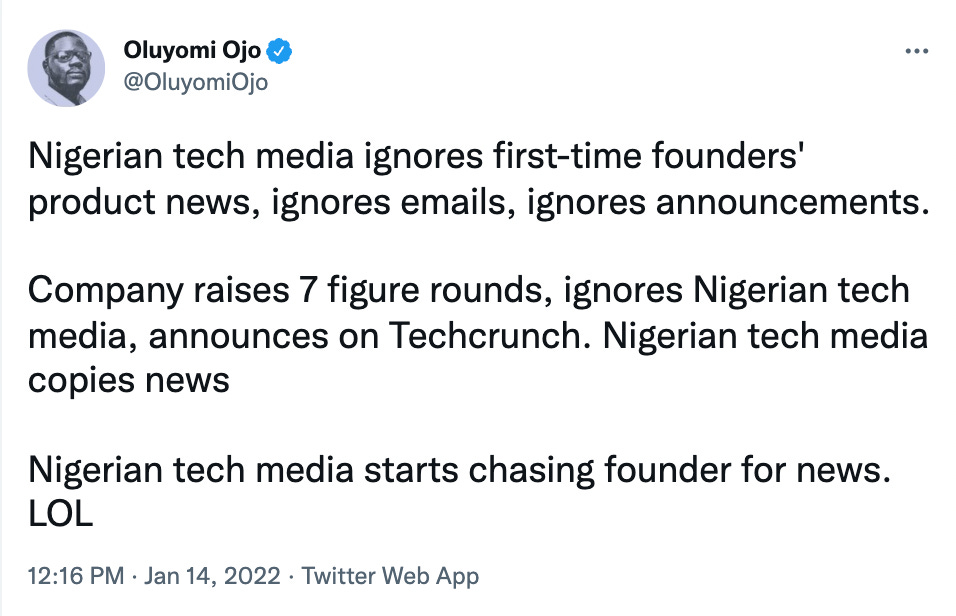

Discover more from Communiqué
Communiqué 20: How African tech startups can get better PR
What do tech startups need to know about PR and storytelling?

Some essays don’t require creative openers. Present your argument, examine the data, state your conclusions, and move on. Maybe sprinkle some love and light at the end to show that you’ve published what you just did in good faith. But ultimately, you don’t need a fancy opener.
Before the end of this newsletter, we’ll talk about the importance of data-backed conversations, and most importantly, how startups should think about PR and storytelling.
Stay with me.
When we talk about tech media across Africa, perhaps the most significant criticism is that they aren’t critical enough. They either don’t critique founders, startups, and the broader ecosystem enough, or they publish too many rosy, friendly stories. In two previous newsletters, I have alluded to this challenge.
In “Paystack’s media threat”, I wrote:
“For so long, African tech and business publications have served as informal publicists of their ecosystems, with some exceptions. That strategy is no longer sustainable. Society will always need journalism, but journalism that cannot be differentiated from content marketing and Public Relations is impotent and puts its purveyors in danger.”
In another essay, I wrote about my early days covering startups with TechCabal and Techpoint:
“Most of our stories revolved around startup and founder profiles (we wrote about any and every startup we could find)... Anyone aware enough at the time would’ve criticised us for writing about every Tom, Dick, and Harriet who had a startup idea. But we did what we did because that was all we had to work with.”
There’s no version of the universe in which anyone should criticise African tech journalists and writers for not doing enough to cover the stories of local startups and founders. The criticism is often that they do too much of this and not enough of other stories. There’s no version of the universe in which African tech media aren’t supportive of founders and startups. At least, there shouldn’t be.
The unlikely universe
This tweet sparked a conversation over the weekend, and the responses have been interesting, especially those that agree with its premise. They argue that it’s true – that the media often ignores a startup until it is too big to ignore anymore. Some say the media is a “cabal”. Others say that the onus is on the journalists to “find the next best story”. Are they all correct?
The other side refutes this claim. They say that the tech media has supported startups in the ecosystem. Some say that startups need to understand the media better. Others say that the onus is on the startups to get their storytelling right. Are they all correct?
Let’s look at the data
We took a sample of 20 African startups featured on TechCrunch between 2019 and 2022 to see where each of them got their first press coverage. We excluded some startups with founders who have been in the news multiple times, won major awards in the past, or received some level of international recognition. We also excluded startups that have raised multiple or high-volume rounds ($10 million and above).
Of the 13 Nigerian startups on the list, 92.3% first appeared on local media, and none were first featured on TechCrunch. Of all the 20 African startups on the list, 85% were first featured in the local media and 25% in the international media. None of them was first featured on TechCrunch, and none of the 25% is a Nigerian startup. All of the Nigerian startups from our sample size first appeared in local media stories before their eventual international coverage.
Despite what this limited sample size shows us, you can’t shake off the feeling that the data is incomplete and doesn’t tell the whole story.
If a significant enough number of people feel a certain way about something, if they think that thing is true, even if you can argue to the contrary with data, their beliefs are still worth examining. Perhaps there is some truth in there that we can learn from?
PR 101 for startups
There are two facts to consider: tech journalists are constantly looking for stories (because their jobs depend on it), and there will always be startups or companies in the news. I explain this in a previous essay using Stephan Russ-Mohl’s three markets of journalism model.
So, when it comes to media coverage, there are several factors in play, the chief of which is newsworthiness. The classic analogy from journalism school is that if a dog bites a man, that isn’t news. It happens all the time. But if a man bites a dog, that’s news.
One of my main arguments in this conversation is this: the mere fact that a startup exists and the founder thinks that what they’re building is special isn’t enough reason for it to get press coverage.
There’s no founder in this world who doesn’t think what they’re working on is special. There’s no founder in this world who doesn’t believe that more people should know about their product. But none of these is enough reason why a journalist should write about them, just as they aren’t enough reasons why an investor should give them money.
So, as a founder looking to get good press for your company or product, especially if you’re a first-time founder who can’t hire a communications person or agency, what do you need to know about how the media works?
Know what counts as news. I’ve reviewed a lot of startup press releases and pitches over the years, and my initial impression is often that the writers (who usually aren’t communications professionals) don’t understand what counts as newsworthy.
Newsworthiness is social. It’s hardly about your company or product and more about what it means in the grand scheme of things. A good rule of thumb is “social benefit”. Ask yourself how your company or product benefits people and who it has benefited. That's often where the story is.
(PS: Fundraising stories fall into this category because they have obvious social benefits.)
Understand the news cycle. Much of this point boils down to knowing what the journalists you’re pitching your company to are interested in. Think of your startup as one out of a pool of several suitors vying for the same person's attention.
You can’t stand out of the crowd if you have no idea what the person you’re trying to woo is interested in. That’s how it works in journalism.
Every journalist has topics or areas they’re most interested in. If you respect their work enough, you’ll do your research and find out where your startup’s story falls.
Employ social proof. The reason local media will start to pay attention to a startup that has raised a lot of money and announced it on TechCrunch is that the startup has established some form of social proof. No one will pay attention to a product or company with no testimonials or enough social proof. It’s even better if the proof comes from well-known sources.
People are more likely to accept things from those they know or are familiar with.
Build your owned media channels. There are three categories of media in marketing: Paid media, earned media, and owned media. Owned media refers to the content you produce in-house and publish for free on your digital channels.
If telling your startup’s story is that important to you, it’ll show. If you can’t hire in-house storytellers yet, you might have to do it yourself. The better you are at telling your stories, the more likely you are to attract media attention. (Ask Elon Musk.)
Remember that no one understands and cares about your narrative more than you.
Conclusion
It’s interesting to see how strongly people feel about the relationship between tech media and startups. I’ve read enough comments to know that this is a touchy subject. As with most conversations on Twitter, there’s very little care for nuance. But there is nuance to this conversation. It’s less about who’s right and wrong and more about how constructive we can be with each other.
To end today’s essay, I’d like to help four new startups (two female-led, two male-led) craft their stories and communications strategies for free. Reach out and pitch yourself. I look forward to hearing from you!






You did an amazing job chronicling this David.
Another thing I think a lot of people miss out on is this - thinking about what would get the media platform the clicks they need, what their audience want to read, what other platforms will quote... thinking about key things like that help. You just have to put yourself in the shoes of the media outlet and if you can't figure it out. Just ask.
Excellent piece! I think it's an issue of not properly thinking about and understanding local media's incentives, startups just want their story out there!
I'll just be forwarding this piece to anybody that wants to argue from now on.